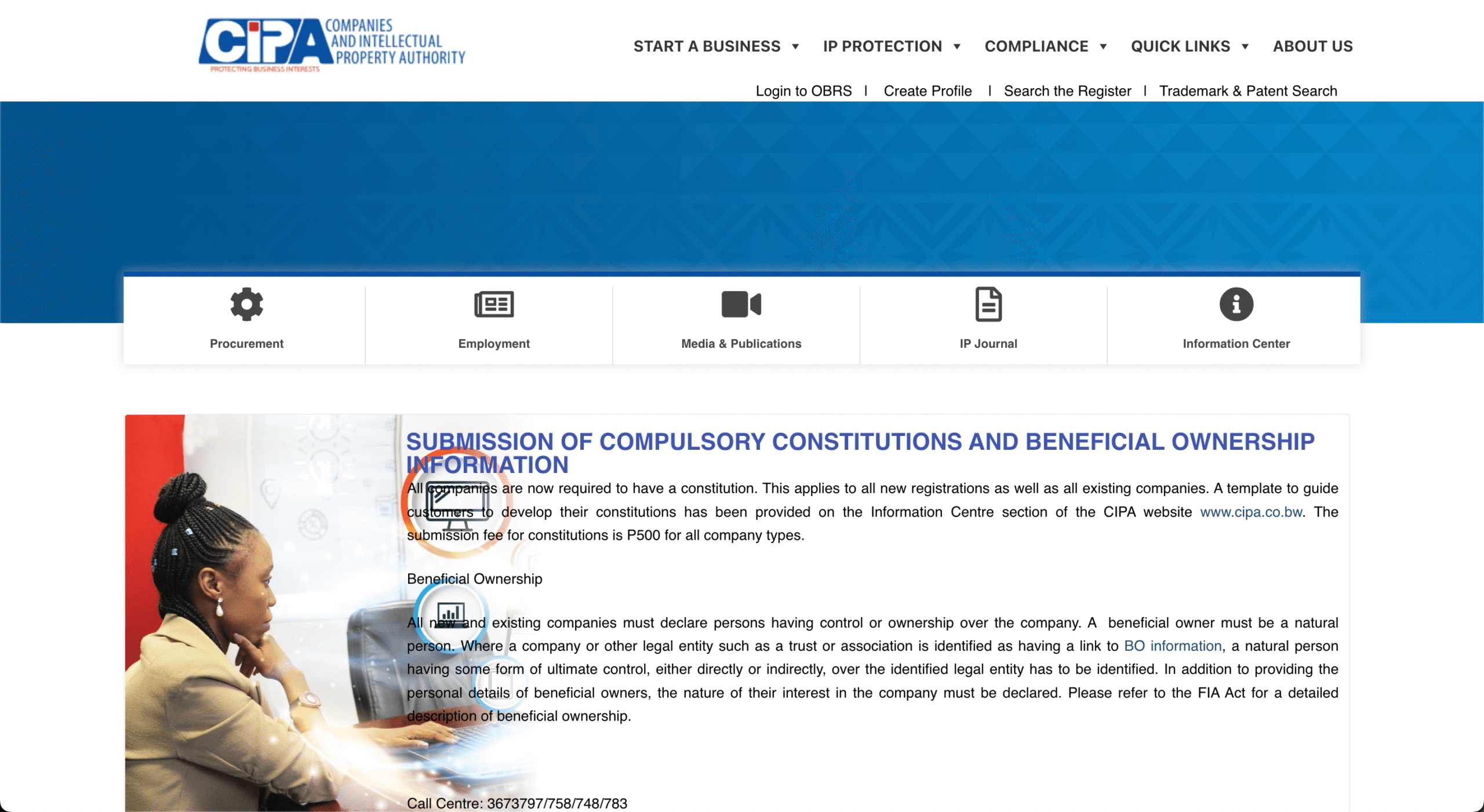Key Takeaways
- CIPA’s Role in Botswana: The Companies and Intellectual Property Authority (CIPA) ensures legal compliance and supports business growth through company registration, intellectual property protection, and regulatory monitoring.
- Compliance is Crucial for Tenders: Registering with CIPA is mandatory for businesses participating in tenders, providing legal recognition and enhancing eligibility.
- Transparency and Credibility: CIPA maintains centralized records, which promote transparency, improve stakeholder confidence, and streamline tender evaluations.
- Digital Convenience: CIPA’s online services simplify business registration, compliance tracking, and document access, saving time during the tendering process.
- Challenges to Note: Limited digital access, processing delays, and lack of public awareness about CIPA’s services can hinder effective compliance for some businesses.
- Competitive Advantage: Proper engagement with CIPA strengthens your business’s credibility and improves its chances of securing tenders in Botswana.
If you’re navigating the business landscape in Botswana, you’ve likely come across the term CIPA. The Companies and Intellectual Property Authority (CIPA) plays a crucial role in ensuring businesses operate within the legal framework while fostering innovation and growth. But what exactly does CIPA do, and why does it matter for tenders?
For businesses aiming to secure tenders in Botswana, compliance with CIPA is more than just a formality—it’s a necessity. From company registration to intellectual property protection, CIPA ensures that your business is fully recognized and legally compliant. Understanding its importance can give you a competitive edge and help you avoid costly setbacks.
What Is CIPA?
The Companies and Intellectual Property Authority (CIPA) is a statutory body in Botswana responsible for company registration and intellectual property administration. It plays a key role in creating a structured legal framework for businesses.
Overview Of CIPA
CIPA was established by the Companies and Intellectual Property Authority Act of 2011 to streamline business operations. It oversees the registration of companies, business names, and nonprofit organizations. Intellectual property rights, including patents, trademarks, copyrights, and industrial designs, also fall under its jurisdiction. This institutional framework simplifies compliance and protects your business interests.
Primary Functions Of CIPA
- Company Registration: Ensures your business obtains legal recognition, making it eligible for formal operations and tenders. For example, entities bidding for government contracts must be registered with CIPA.
- Intellectual Property Protection: Safeguards your innovations by granting exclusive rights to patented inventions, trademarks, or designs.
- Filing and Record Maintenance: Maintains a centralized database for company and intellectual property records, ensuring accessibility and transparency for stakeholders.
- Public Awareness Campaigns: Promotes awareness about intellectual property rights and legal obligations among business owners.
- Compliance Monitoring: Enforces regulations to ensure businesses adhere to legal requirements, helping you avoid penalties or operational disruptions.
Proper engagement with CIPA secures your business’s legal standing and enhances its credibility in Botswana’s tendering process.
Importance Of CIPA For Tenders In Botswana
CIPA plays a critical role in ensuring businesses meet essential requirements for participating in tenders. Its framework supports legal compliance, transparency, and efficiency, which are key factors in Botswana’s tendering environment.
Legal And Regulatory Compliance
Compliance with CIPA ensures your business meets Botswana’s legal and regulatory standards. Registering your company and intellectual property with CIPA provides official recognition, which is often a mandatory criterion in tender applications. For example, government and private tenders typically require proof of company registration and compliance certificates issued by CIPA. By adhering to these regulations, you demonstrate your business’s legitimacy and enhance eligibility.
Enhancing Business Transparency
CIPA registration improves transparency by maintaining accurate, centralized records of business entities. This database allows tender committees to verify company details, such as ownership or registration status, quickly and efficiently. Transparent records reduce risks of fraud, clarifying your business activities and boosting trustworthiness. In a competitive tendering process, transparency through CIPA can provide a decisive advantage.
Streamlining Tender Processes
CIPA facilitates streamlined processes by offering digital services, including e-registration and compliance monitoring. These tools reduce administrative delays, ensuring your business stays compliant and submits required documentation on time. For instance, submitting tenders often requires certified copies of registration documents or intellectual property certificates, which are accessible through CIPA’s platforms. By streamlining these processes, CIPA minimizes obstacles and enhances your chances of securing tenders.
Benefits Of Using CIPA In Tenders
Using CIPA in the tendering process in Botswana offers significant advantages. It ensures efficiency, transparency, and enhances your business’s competitive position.
Simplified Business Registration
CIPA provides an efficient platform for registering your company before tendering. Its digital system allows quick registration of business entities, nonprofit organizations, and intellectual property, reducing paperwork and delays. You gain immediate access to all relevant compliance documents through a centralized system, essential for tender submissions.
Faster Information Verification
Tender committees evaluate submissions more efficiently with CIPA’s centralized database. Registered companies’ details, including compliance status and intellectual property records, are readily available. This reduces the time spent verifying authenticity and minimizes risks of errors or fraudulent claims during reviews.
Improved Stakeholder Confidence
CIPA registration boosts your company’s credibility with stakeholders. Proof of compliance signals adherence to regulatory requirements and fosters trust among tender committees. Transparent business operations, backed by CIPA documents, make your entity more reliable, increasing your chances of securing tenders in Botswana.
Challenges And Limitations
CIPA supports businesses in Botswana, but certain challenges can affect its efficiency, particularly in the context of tenders. These challenges impact accessibility and the awareness of its services.
Accessibility Issues
Limited digital access and infrastructure gaps can hinder the registration process and compliance tracking. While CIPA offers online services, businesses in remote areas may face challenges due to poor internet connectivity or lack of digital literacy. Delays in accessing critical documents, like compliance certificates, can negatively affect tender timelines. Additionally, the centralized approach might create processing bottlenecks, especially during peak periods, which can slow down registration or renewal procedures.
Awareness And Education
Many businesses remain unaware of CIPA’s role, services, and relevance to tendering requirements. This lack of awareness can lead to non-compliance, lost opportunities, and delays in meeting tender criteria. Insufficient educational outreach and training programs exacerbate this issue, leaving small and medium-sized enterprises (SMEs) without the tools to leverage CIPA’s features effectively. Enhanced public education efforts could bridge this gap, ensuring businesses understand their obligations and the benefits of compliance.
Conclusion
Understanding CIPA’s role is essential for navigating Botswana’s tendering landscape. By ensuring compliance and leveraging its streamlined services, you can enhance your business’s credibility and competitiveness.
While challenges like limited access and awareness exist, staying informed about CIPA’s requirements and benefits can position your business for success. Investing in compliance isn’t just about meeting regulations—it’s about building trust and opening doors to new opportunities.





